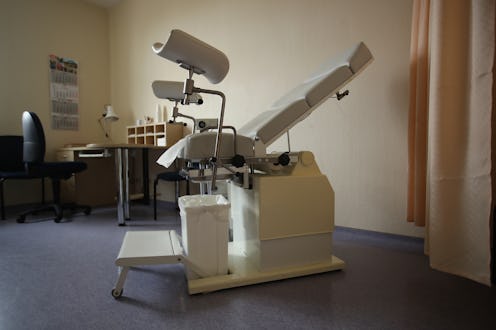News
This Is What Happens During A Pelvic Exam Before An Abortion

Reports that Missouri's last abortion clinic is refusing to comply with state regulations mandating providers perform pelvic exams during initial consult appointments 72 hours ahead of an abortion has left some wondering just what the deal is with abortion and pelvic exams.
Earlier this week, Planned Parenthood of St. Louis told CBS News it had evidence proving patients had been "harmed" because they were forced to undergo what the clinic called an "inappropriate, medically unnecessary, unethical pelvic exam" during consultation appointments. As a result, the clinic said it would refuse to comply with the regulation going forward, even if it further jeopardized the clinic's license.
"We are choosing to provide the best quality, patient centered care that we've always provided at Planned Parenthood," the clinic's medical director, Dr. David Eisenberg, told CBS News. "And that includes doing things that are driven by science, by evidence, and by what's medically appropriate."
Providers at the clinic told the Associated Press they were moved to stop performing pelvic exams at consult appointments as regulations require following feedback from patients. What's more, they deemed the state's pelvic exam regulation "dehumanizing."
"We believe continuing to force an additional invasive and uncomfortable vaginal exam on patients at least three days before her abortion procedure, when it is not medically indicated, and when she will have the identical exam on the day of the abortion procedure, is not patient-centered; it is disrespectful and dehumanizing," Dr. Colleen McNicholas, an abortion provider at the St. Louis clinic, said in a statement, according to the AP.
In a press conference held Friday, Missouri Department of Health and Senior Services Director Randall W. Williams, MD, FACOG, issued an emergency rule allowing Planned Parenthood to defer the required pelvic exam to the day of surgery "if in their estimation, using their clinical judgement, that they think there is a medical reason to do that.
"We do not want patients having two pelvic exams," Williams said.
As Bustle has previously explained, abortion providers in the state feel the Missouri's pelvic exam rule for abortions is invasive and medically unnecessary — here's what you need to know about pelvic exams.
What's The Point Of A Pelvic Exam?
According to Planned Parenthood, a pelvic exam enables a doctor to evaluate a patient's reproductive organs, including the vagina, cervix, ovaries, uterus, and fallopian tubes. They can help doctors detect things like vaginal infections and some sexually transmitted infections.
Dr. Alice Mark, MD, MSc, the medical director of the National Abortion Federation (NAF), tells Bustle that pelvic exams are sometimes — generally at the provider's discretion unless, as is the case in Missouri, state mandated — performed ahead of surgical abortions because they also enable providers to detect the size and shape of a patient's uterus.
What Happens During A Pelvic Exam?
If you're over the age of 21 and have been to the gynecologist for a wellness visit, you're likely already aware of what a pelvic exam entails. As Planned Parenthood points out on its website, pelvic exams are an in-office procedure that last only a few minutes and, while they may be uncomfortable, they shouldn't hurt.
According to the Mayo Clinic, a pelvic exam generally includes an external visual exam, during which a doctor checks the vulva for signs of irritation or abnormalities, followed by an internal visual exam. during which a speculum is used to open the vagina to allow access to the cervix. During wellness visits, pelvic exams are sometimes conducted in conjunction with a pap smear.
Finally, the doctor will conduct a physical exam, or "bimanual exam," in which they insert two gloved fingers into the vagina while pressing their other hand on the lower abdomen in order to feel internal pelvic organs such as the uterus and ovaries.
What Does A Doctor Learn From A Pelvic Exam?
According to the Mayo Clinic, pelvic exams can alert medical providers to "possible signs of ovarian cysts, sexually transmitted infections, uterine fibroids or early-stage cancer." Moreover, they can help doctors diagnose the cause of various gynecological symptoms, including pelvic pain or abnormal vaginal bleeding or discharge.
And, as Mark says, a bimanual exam gives abortion providers the opportunity to determine the size and shape of a patient's uterus — information that can help them in the actual procedure. "[A pelvic exam] is often done before a surgical abortion to help guide the provider during the procedure," Mark says. "However, not all providers perform a bimanual exam — it's really up to their discretion." For example, Mark says it's "completely unnecessary" to do a pelvic exam before a medication abortion.
While the future of Missouri's only abortion clinic remains unclear (the clinic is fighting the state's efforts to not renew its license in court), the emergency rule issued Friday by Missouri Department of Health and Senior Services means patients at the clinic will no longer have to undergo two pelvic exams before abortion procedures — a welcome relief.